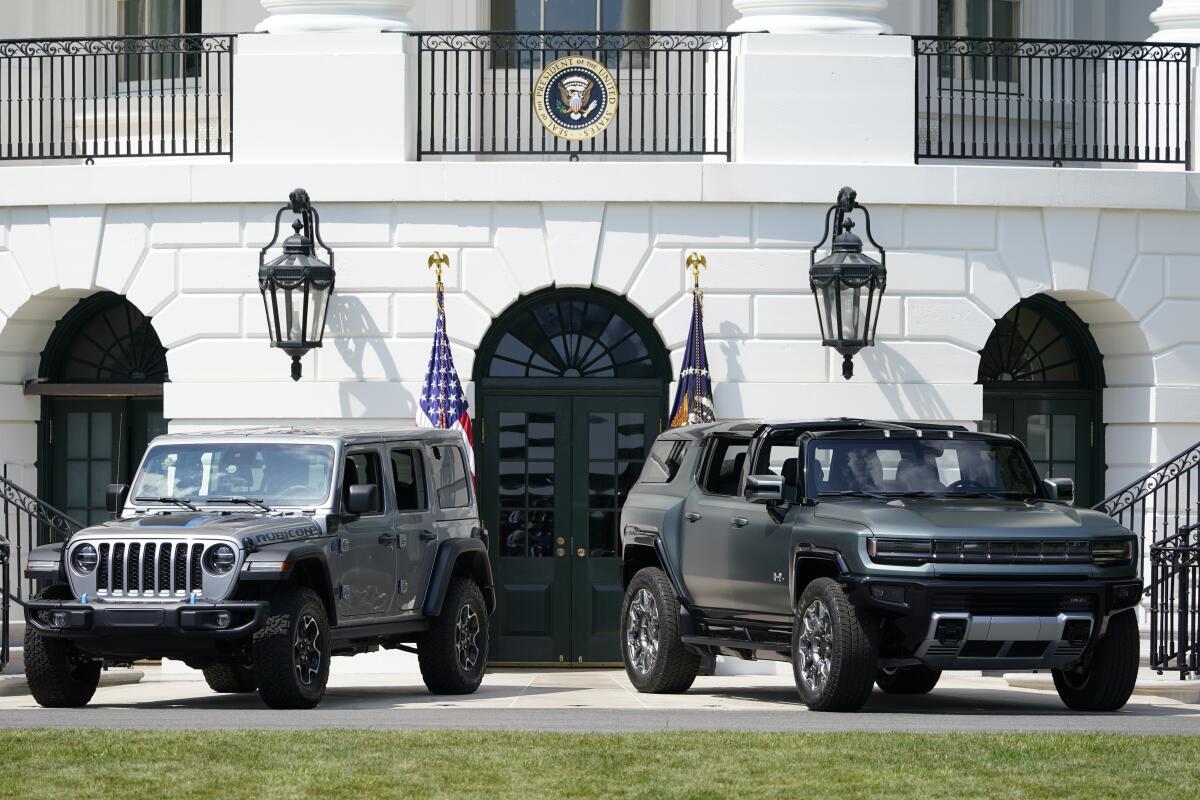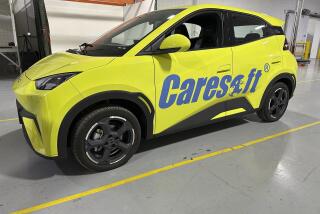Editorial: Biden needs to put the pedal to the metal on zero-emission cars

- Share via
President Biden is right. Electric vehicles are the future. But for the sake of the planet, the future has to arrive much sooner than the president and automakers are planning.
On Thursday, Biden proposed new fuel efficiency and tailpipe emissions standards for passenger cars and trucks that would in effect reverse President Trump’s clean-car rollback, getting U.S.-made vehicles just about back to the standards put in place by the Obama administration. It’s a return to what should have been the status quo.
The president also signed an executive order setting an ambitious but voluntary target that by 2030, half of the new vehicles sold in the U.S. will be zero-emission models, including battery electric, plug-in hybrid or fuel cell electric. The three big U.S. automakers aimed a tad lower, announcing their “shared aspiration” to have zero-emission vehicles make up 40% to 50% of their U.S. sales.
Here’s the harsh reality: The status quo is unsustainable, and targets and aspirations are no longer sufficient. It should be obvious by now that climate change is creating havoc and destruction across the globe. It will take dramatic action to cut greenhouse gas emissions enough to prevent a climate catastrophe. In the U.S., where gas-powered cars and trucks are the single largest source of greenhouse gas emissions, that means accelerating the transition to clean vehicles.
The signs coming out of dealerships haven’t been good. Consumers have been buying more gas-guzzling SUVs and trucks over the years. Electric vehicles make up just 2% of the U.S. new car sales market, which is less than in China and many European countries. In May, the International Energy Agency warned that governments will need to end the sale of new internal combustion engine vehicles by 2035 in order to help reduce greenhouse gas emissions enough to avoid the worst impacts of climate change. So the U.S. has a lot of catching up to do.
The country lost precious time and momentum toward clean cars during the Trump administration. Prodded by automakers, Trump relaxed Obama-era standards that required cars and light trucks to become steadily more fuel efficient; by 2025, they were supposed to achieve an average of more than 50 miles per gallon. Automakers were expected to meet the target by developing and selling more hybrid and electric models, gradually cutting smoggy tailpipe pollution and greenhouse gas emissions in the process.
Trump’s standard called for automakers to reach an average of 40 mpg by 2026, which would have allowed companies to continue to produce more gas-guzzling SUVs and trucks. Biden’s proposal, which still has to go through the rulemaking process, would reset the average fuel economy target at more than 50 mpg by 2026. Biden also directed his administration to begin developing stricter fuel economy and emissions standards for 2027 and beyond.
At least in the short term, the U.S. is back where it was four years ago while other countries have pressed forward, setting high goals for zero-emission vehicle deployment. China in particular has embraced EVs, spurring the development of battery technology and a supply chain for EV manufacturing while increasing private investment in the field. Now, there is a real concern that American automakers’ lethargy during the Trump years could end up hurting the U.S. industry’s global competitiveness.
Essential environmental and economic policies should not flip-flop so easily between administrations. While Biden’s voluntary target of 50% zero-emission vehicle sales by 2030 is a good start, his administration and Congress need to cement this goal into law. They also need to follow through with funding to help build out a national network of EV charging stations and offer financial incentives for customers to buy zero-emission vehicles — two pieces of the president’s initial, far-reaching infrastructure proposal that have been either slashed or eliminated in the bipartisan bill the Senate is considering. Biden should make it absolutely clear to automakers and the public that the future really will be electric.
More to Read
A cure for the common opinion
Get thought-provoking perspectives with our weekly newsletter.
You may occasionally receive promotional content from the Los Angeles Times.










